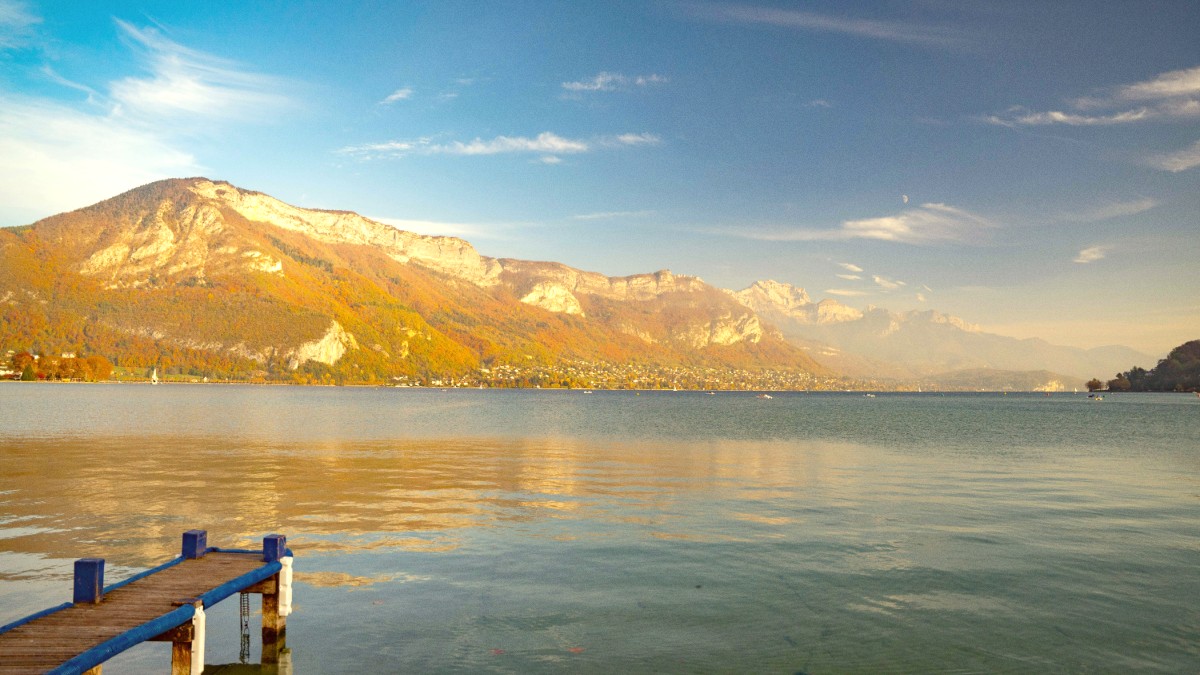
The French Alps, France
Spring (April-May): Temperatures are mild, averaging 10-15°C (50-59°F). The lake begins to warm, and activities gradually begin. Days lengthen.
Autumn (September-October): Temperatures are mild to cool, averaging 10-18°C (50-64°F). Lake activities slow as the water cools. This period brings pleasant weather for walking and cycling.
Consider visiting in early September. The weather stays pleasant, the lake is warm enough for swimming, and summer crowds have dispersed.
This time presents a good balance between agreeable weather and manageable visitor numbers.
July - August
Warmest weather for water sports. All tourist services operational. Long daylight hours for sightseeing.
Most crowded. Highest prices for accommodation and activities. Potential for heatwaves.
May - June, September - October
Pleasant weather for hiking, cycling, sightseeing. Fewer crowds. Moderate prices. Beautiful blooms or autumn foliage.
Lake water may be cool for swimming (May, Oct). Some seasonal services have reduced hours. Unpredictable weather.
November - April
Lowest accommodation prices. Minimal tourist crowds. Ideal for nearby winter sports. Festive ambiance in December.
Cold weather, shorter daylight hours. Most lake activities closed. Some shops/restaurants have reduced hours. Snow impacts mountain road access.
Regular snowfall graces the surrounding Alpine peaks during winter. This might change driving conditions on mountain roads, sometimes calling for snow tires or chains.
Summer afternoons may experience sudden thunderstorms. These storms are often brief but display intensity. Daily weather forecasts are wise, and indoor activity alternatives are useful. While not annual, heatwaves may occur in July and August. Stay hydrated and seek shade during the hottest parts of the day.
July to August present the warmest lake temperatures.
May to June, and September to October deliver agreeable temperatures and fewer crowds on trails.
December to March marks the prime season for surrounding Alpine ski resorts.
May, September, and October are excellent for exploring the Old Town and attractions without large crowds.
Early December for a festive atmosphere.
France is a member of the Schengen Area, a zone of 27 European countries that do not have passport and border control at their mutual borders. This means that once you enter the Schengen Area, travel between member countries involves no additional border checks.
Citizens from many countries, including the United States, Canada, Australia, the United Kingdom, New Zealand, Japan, South Korea, and most European Union member states, do not need a visa for tourism or business stays up to 90 days within any 180-day period. This flexibility is considerable for shorter trips. For these nationalities, a valid passport is the typical entry criterion.
Citizens from various other countries, like India, China, South Africa, and many others not on the visa-exempt list, must obtain a Schengen Visa before arrival. This visa allows a stay of up to 90 days within the Schengen Area.
The cost of a trip to Annecy varies significantly based on your travel style, from budget-conscious to luxury. The official currency in France, and thus in Annecy, is the Euro (€).
| Travel Style | Daily Cost Range | Accommodation (per night) |
|---|---|---|
| Budget | €50-€80 | €25-€40 (Hostel dorm, basic guesthouse) |
| Mid-range | €100-€200 | €120-€250 (2-3 star hotel, mid-range apartment) |
| Luxury | €250+ | €300+ (4-5 star hotel, premium vacation rental) |
France has a high standard of public services, including healthcare and safety.
No specific vaccinations are mandatory for France. Routine vaccinations (MMR, DTP, Polio, Hep B) should be current. Consult a medical professional 4-6 weeks before your trip for personalized advice.
Sunburn and heatstroke in summer: use Sunscreen, hat, seek shade, hydrate. Insect bites near lake: use Insect repellent like Sawyer Products Picaridin. Seasonal allergies: bring medication. Altitude sickness: not in city, but possible in higher Alps; acclimatize and hydrate.
Tap water in Annecy is safe to drink. Food hygiene standards in establishments are generally high. For water filtration products, consider LifeStraw.
France features a high-quality healthcare system.
EU citizens: Use European Health Insurance Card (EHIC) for public healthcare at reduced cost or free. Non-EU citizens: Comprehensive travel insurance is highly recommended. Without insurance, medical costs can be very high.
Pharmacies (green cross sign) are widespread and offer advice for minor ailments. For non-emergencies, find a "médecin généraliste." The main public hospital is Centre Hospitalier Annecy Genevois (CHAM).
Always carry your insurance policy details.
Comprehensive travel insurance is strongly advised for all travelers. It covers medical emergencies, trip cancellation, lost luggage, and more. For insurance options, consider World Nomads, SafetyWing, or Insubuy.
A good policy addresses medical emergencies, hospitalization, trip cancellation or interruption, lost/delayed luggage, personal liability, and emergency medical evacuation.
For delayed or canceled flights, AirHelp may retrieve up to €600 in compensation.
Annecy is a very safe city for tourists. Violent crime is uncommon. However, like any popular tourist destination, petty crime may occur.
Save all emergency numbers on your phone before your trip. Share your itinerary and emergency contacts with family or friends at home.
European Emergency Number (all services): 112. Police: 17. Fire Brigade: 18. Medical Emergency: 15.
Remain calm. Dial the number. Clearly state your location and the nature of the emergency. If you do not speak French, say "Parlez-vous anglais?".
Have your country's embassy or consulate contact information handy for lost passports, legal matters, or other emergencies requiring diplomatic support.